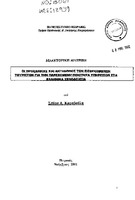| dc.description.abstractEN | The overall purpose of this study was the research of the expectations and perceptions of the incoming tourists of Greece regarding the provided service quality of Greek hotelsand to add to the existing theory. Our research provides an estimation of the level of provided quality, according to the various income levels and the hotel categories. There were six dependent variables in our research. The Perceived Provided Service Quality was the main dependent variable, composed of five quality dimensions according to the Service Quality Model of Zeithaml, Berry και Parasuraman (1988) - namely "Tangibles" , "Reliability", "Responsiveness", "Assurance" and "Empathy". These dimensions were addressed separately as dependent variables. We identified two independet variables, the income level (market segment) and the hotel category, each with three levels, from which a 3X3 factorial design emerges and ten different categories of null hypotheses regarding the effect of the income level and the hotel category to the perceived quality. For the purposes of our study we designed a random, representative sample drawn from the country's main airports and consisted of 1.000 tourists in total, residing in Greek hotels throughout Greeceduring the summer season. the tourists belonged respectively to the high, middle, or low - icome level. A sample consisted of 738 completed questionnaires representing a return rate of 74% provided a useful database for the purpose of our research. The statement of the research hypotheses is followed by the control of hypotheses, which is performed by factorial analysis of variance (ANOVA) and the statistical analysis F with the statistical software SPSS, using Factor Analysis and Cluster Analysis in order to verify the theoretical background of the SER VQUAL model for our research and to segment respectively the clientele Of Greek hotels according to their service quality perceptions. | el |



